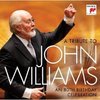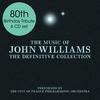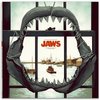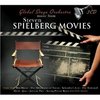Soundtrack Information

Jaws
Varese Sarabande (302 066 078 2 / VSD-6078)
Release Date: September 12, 2000
Conducted by Joel McNeely
Performed by
The Royal Scottish National Orchestra
Format: CD
Music From
Music By
Purchase Soundtrack
Track Listing
| 1. | Main Title | 1:06 |
| 2. | The First Victim | 1:43 |
| 3. | The Empty Raft | 1:15 |
| 4. | The Pier Incident | 2:19 |
| 5. | Father And Son | 2:19 |
| 6. | The Alimentary Canal | 2:02 |
| 7. | Ben Gardner's Boat | 3:21 |
| 8. | Montage | 1:31 |
| 9. | A Tug On The Line | 2:12 |
| 10. | Into The Estuary | 2:49 |
| 11. | Out To Sea | 0:56 |
| 12. | Man Against Beast | 5:15 |
| 13. | Quint's Tale | 2:30 |
| 14. | Brody Panics | 1:16 |
| 15. | Barrel Off Starboard | 1:38 |
| 16. | The Great Chase | 3:02 |
| 17. | Three Barrels Under | 2:05 |
| 18. | From Bad To Worse | 0:53 |
| 19. | Quint Thinks It Over | 1:08 |
| 20. | The Shark Cage Fuge | 2:00 |
| 21. | The Shark Approaches | 0:42 |
| 22. | The Shark Hits The Cage | 1:45 |
| 23. | Quint Meets His End | 1:08 |
| 24. | Blown To Bits | 3:11 |
| 25. | End Title | 1:56 |
| Total Album Time: | 50:02 |
Related Albums

Jaws - 25th Anniversary Collector's EditionDecca Records (289 467 045-2)
Released: July 11, 2000
Format: CD (51 min)

John Williams in ViennaDeutsche Grammophon
Released: August 14, 2020
Formats: CD, Digital, Vinyl (75 min)

John Williams & Steven Spielberg: The Ultimate CollectionSony Masterworks
Released: March 17, 2017
Formats: CD, Digital, Vinyl

Fimucité 6: Universal Pictures 100th Anniversary GalaLimited Edition of 3,000 Copies
Varese SarabandeReleased: July 27, 2015
Format: CD (117 min)

John Williams: A Celebration! An 80th Birthday TributeSony Masterworks
Released: February 28, 2012
Formats: CD, Digital (70 min)

The Music of John Williams: The Definitive CollectionSilva America (SILCD1382)
Released: February 21, 2012
Format: CD (412 min)

Film Music Masterworks: John WilliamsSilva Screen Records, Ltd. (SILCD 2005)
Released: August 8, 2006
Formats: CD, Digital (58 min)

Music from the Films of Steven SpielbergSilva America (SILCD 1182)
Released: 2005
Format: CD (147 min)

The Spielberg / Williams CollaborationSony Classical (SK 45997)
Released: November 1, 1991
Formats: CD, Digital (65 min)

By Request... The Best of John Williams and the Boston Pops OrchestraPhilips Digital Classics (D 125360)
Released: 1987
Format: CD (72 min)
Review: Jaws
3 / 5 Stars
It is one of the most famous two-note themes. John Williams' award-winning score to Jaws still sends shivers down many spines. This year celebrated the 25th Anniversary of the film, and we saw a special edition video and DVD release, as well as a Anniversary Collector's Edition of the original score, with unreleased tracks. So many people were scratching their heads when Varese Sarabande released a re-recording of the original score.
The score is, as we can all agree, an excellent piece of work. So it was decided that Joel McNeely and the Royal Scottish National Orchestra would re-record the (then unavailable) complete score. Recorded in the fall of 1999 (and one day in May, 2000), everything was done for this release before the nice folks at Decca decided to release the original recording. So how do they compare?
The Varese album is technically quite good. The sound quality is very high, as expected for 20-bit digital, but the way it was mixed still feels like a concert recording instead of a closely-miked film score. The performance is mixed, however. I had gotten so used to the original recording that when certain notes weren't hit just right, it felt off-putting. In "The Main Title", the woodwinds seem to have more precedence than the strings in the low "dum-dum", and it had a different feel to it than I recalled it being in the film.
But those are minor complaints. There are parts of the score that are rather difficult to perform, and the RSNO does an admirable job tackling those cues. "Man Against Beast" is still one of my favorite cues, and while there were a few moments that didn't have the same type of energy or emphasis that I would have liked, it still stood out on the album as one of the better cues.
With two albums on the market, people wonder which one they should buy. While the original recording has the obvious problems of a 25-year old recording, this re-recording was done with modern equipment, and has a cleaner sound with no distortion. The original recording is, however, the original recording—and no re-recording can match the energy and performances on that album. If you had to buy only one album, I would suggest the original recording. But if you can afford it, I would actually suggest both recordings, because there are a few cues on the album that just sound much better than a 25-year old recording.
-
Click stars
to rate.
If any information appears to be missing from this page, contact us and let us know!








